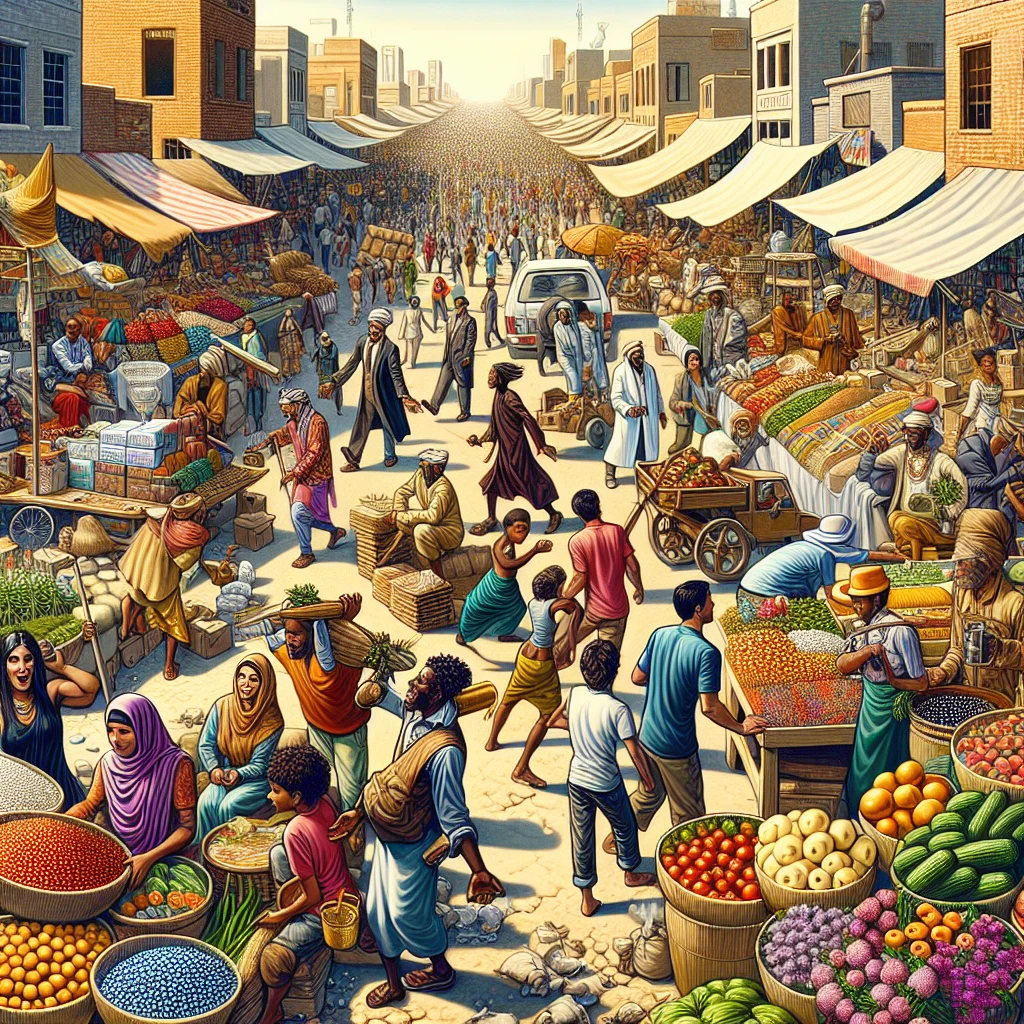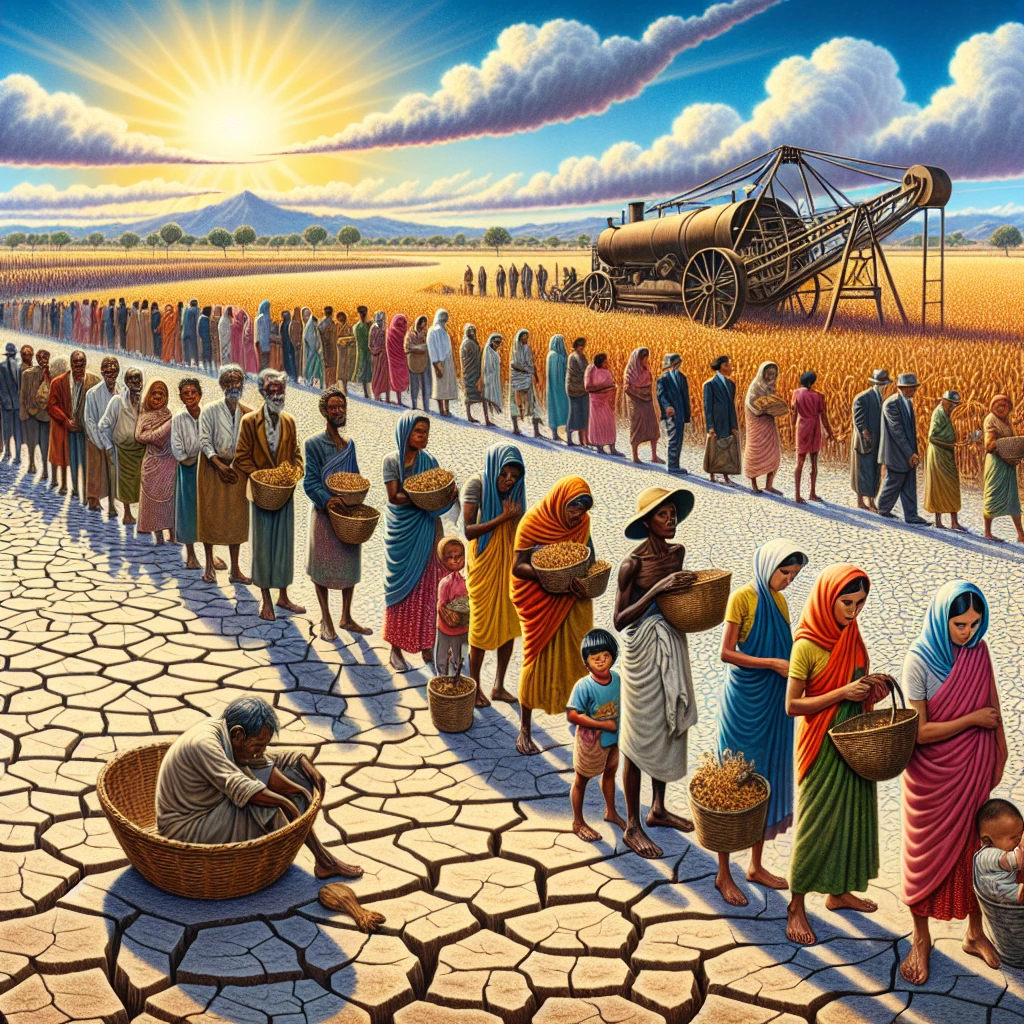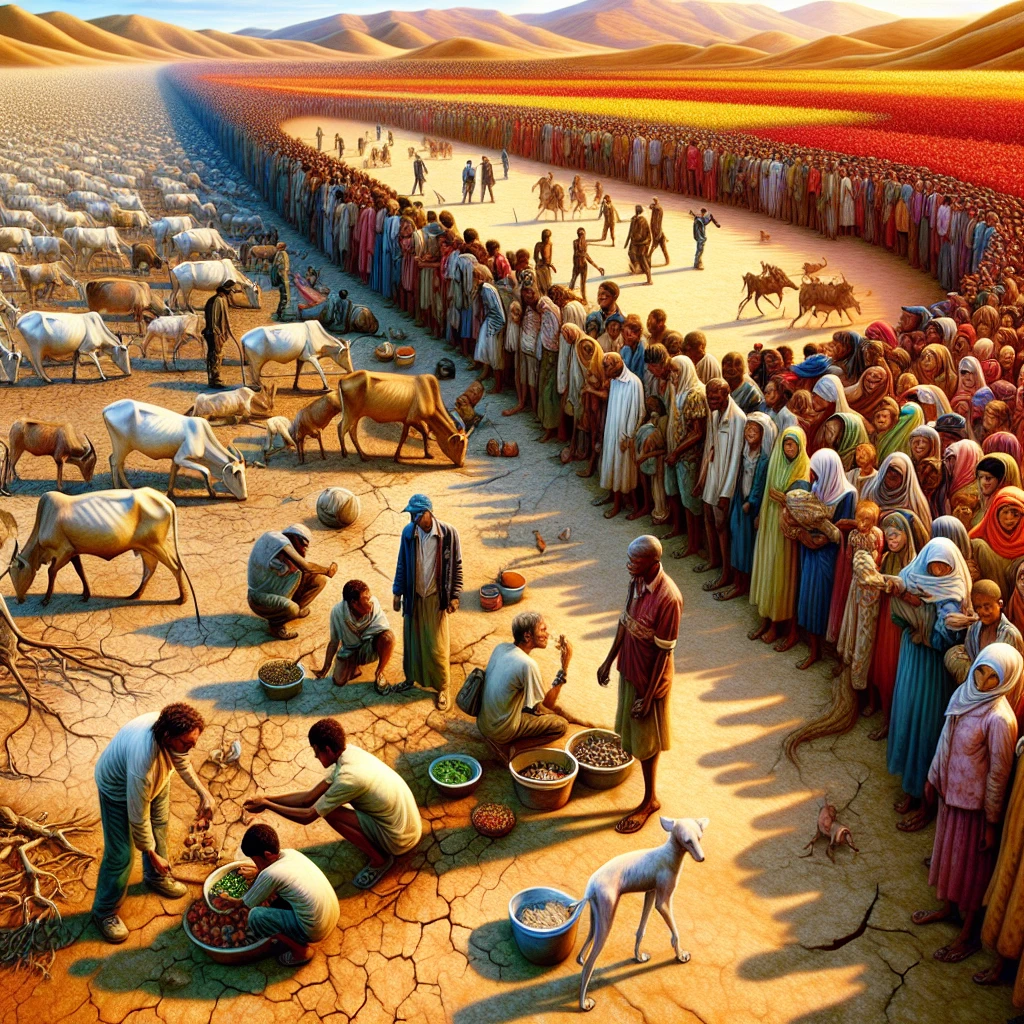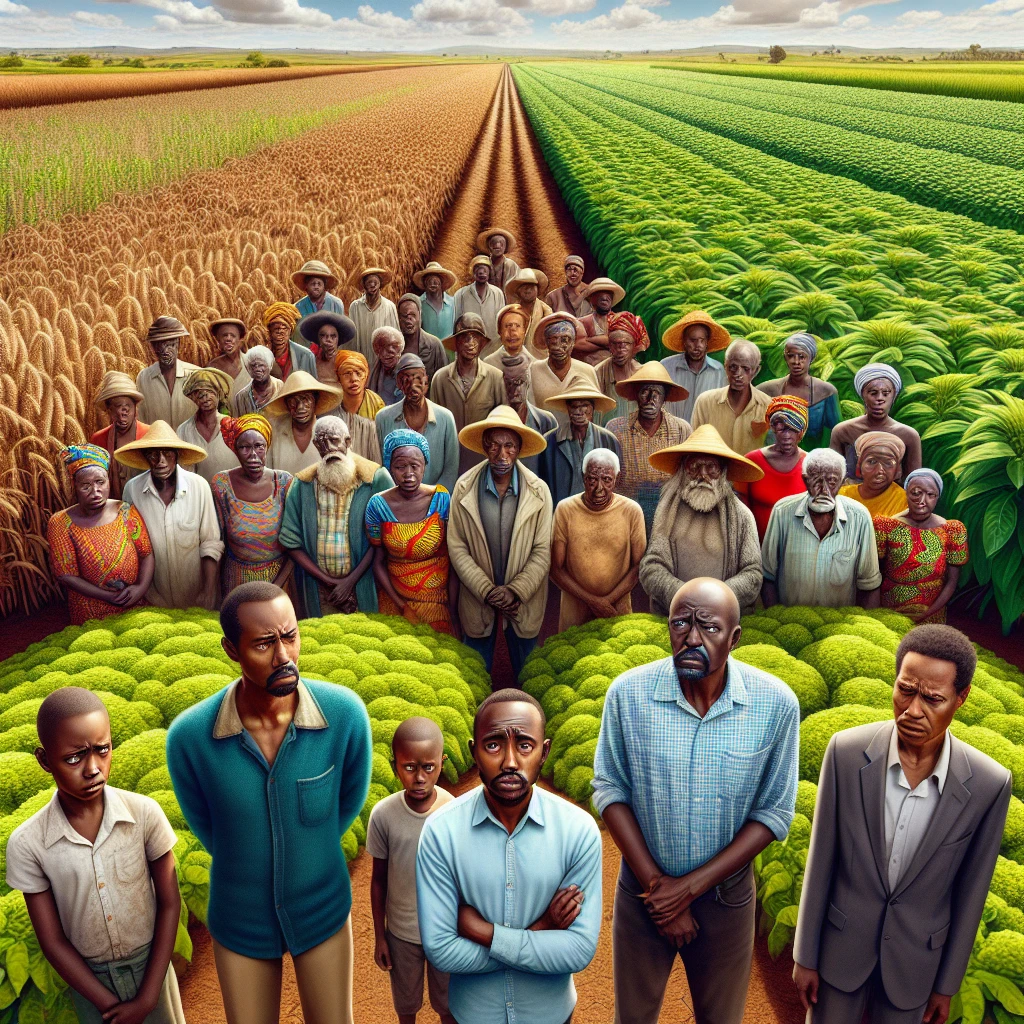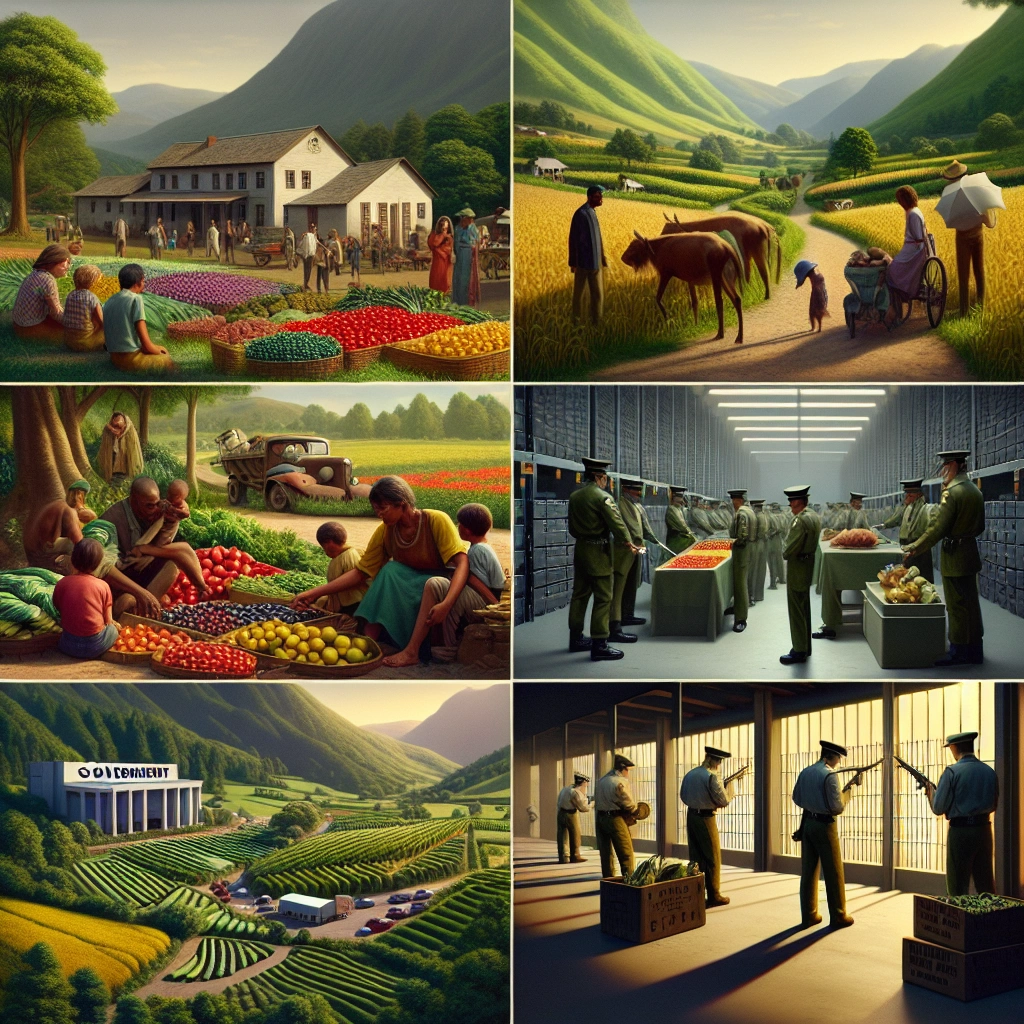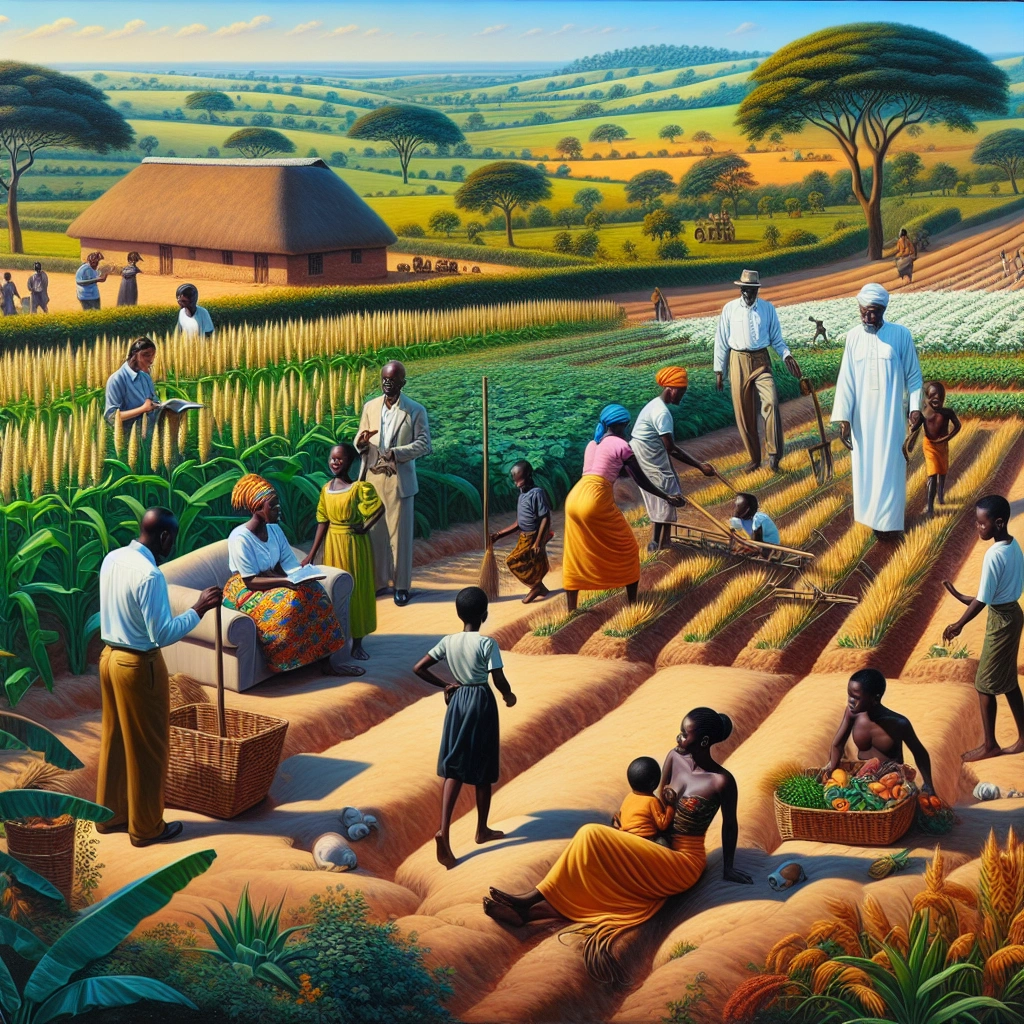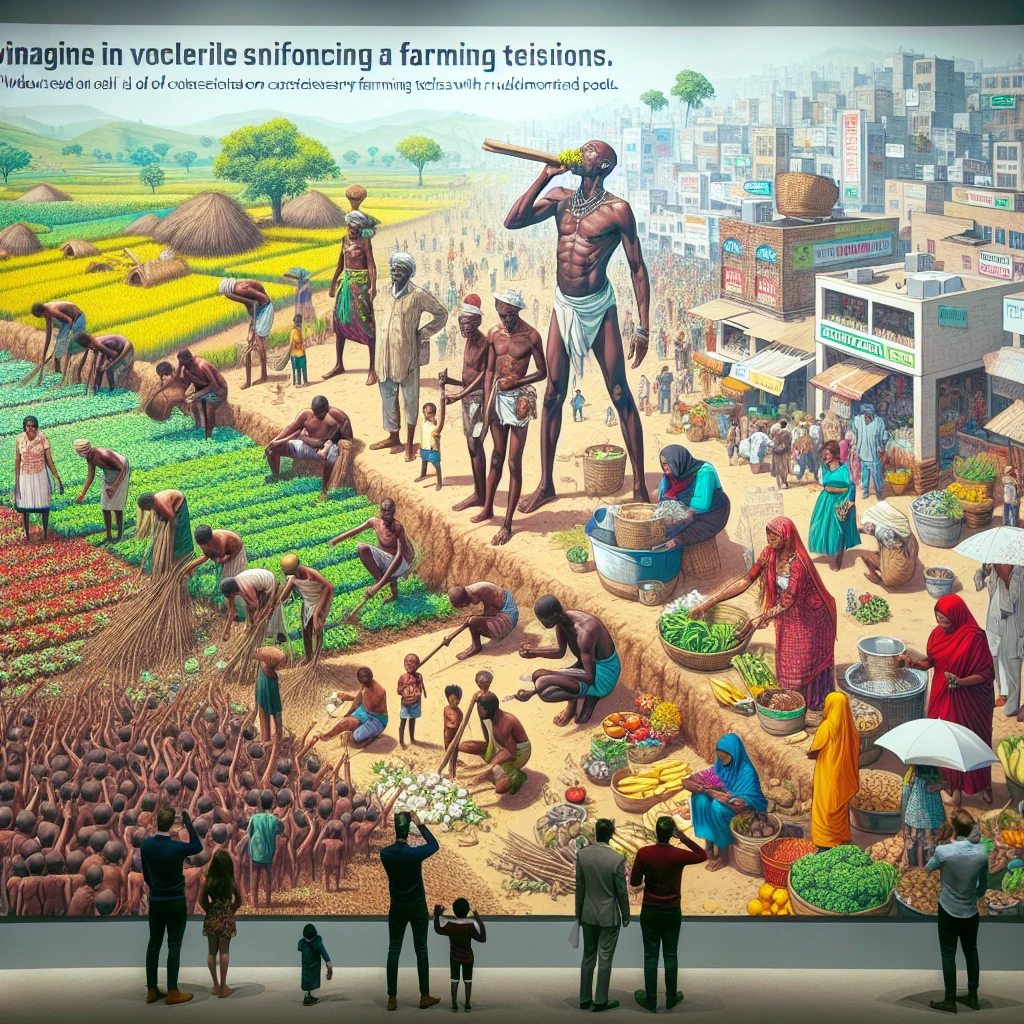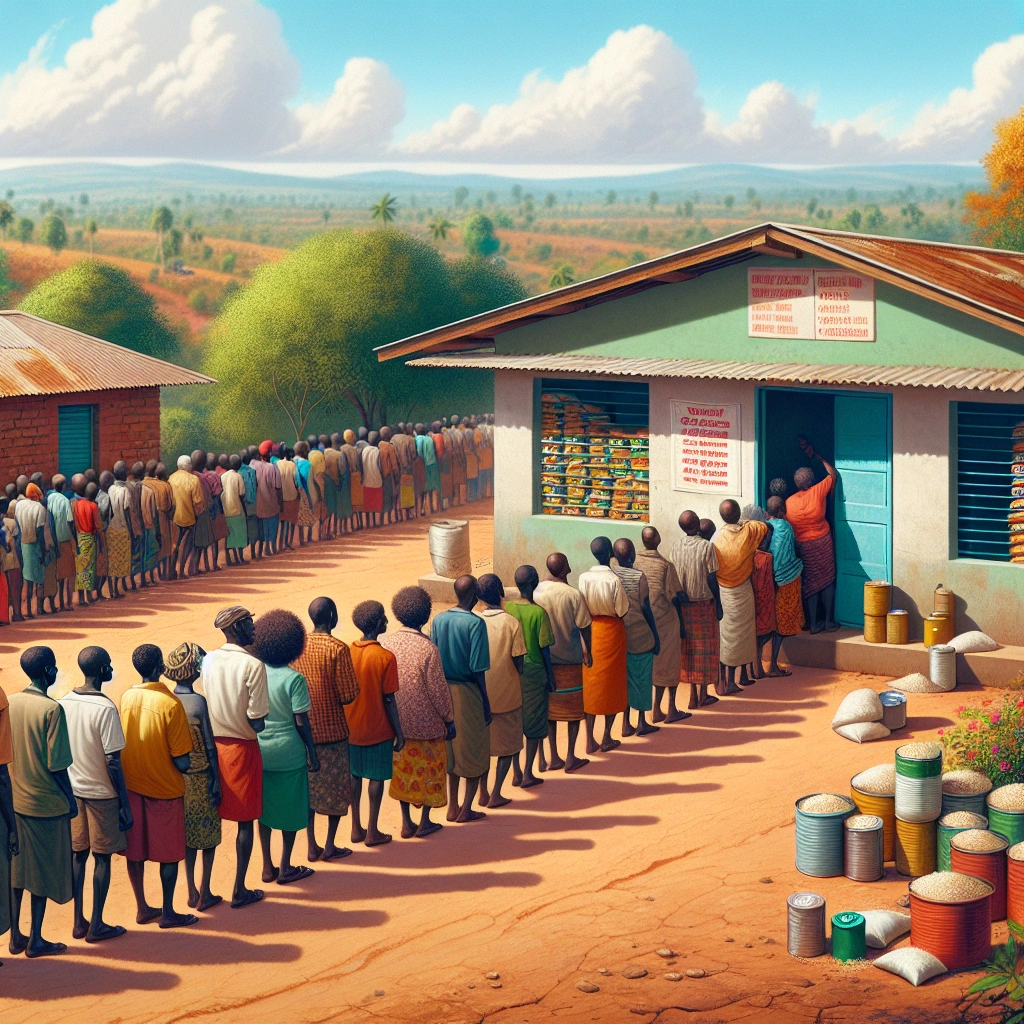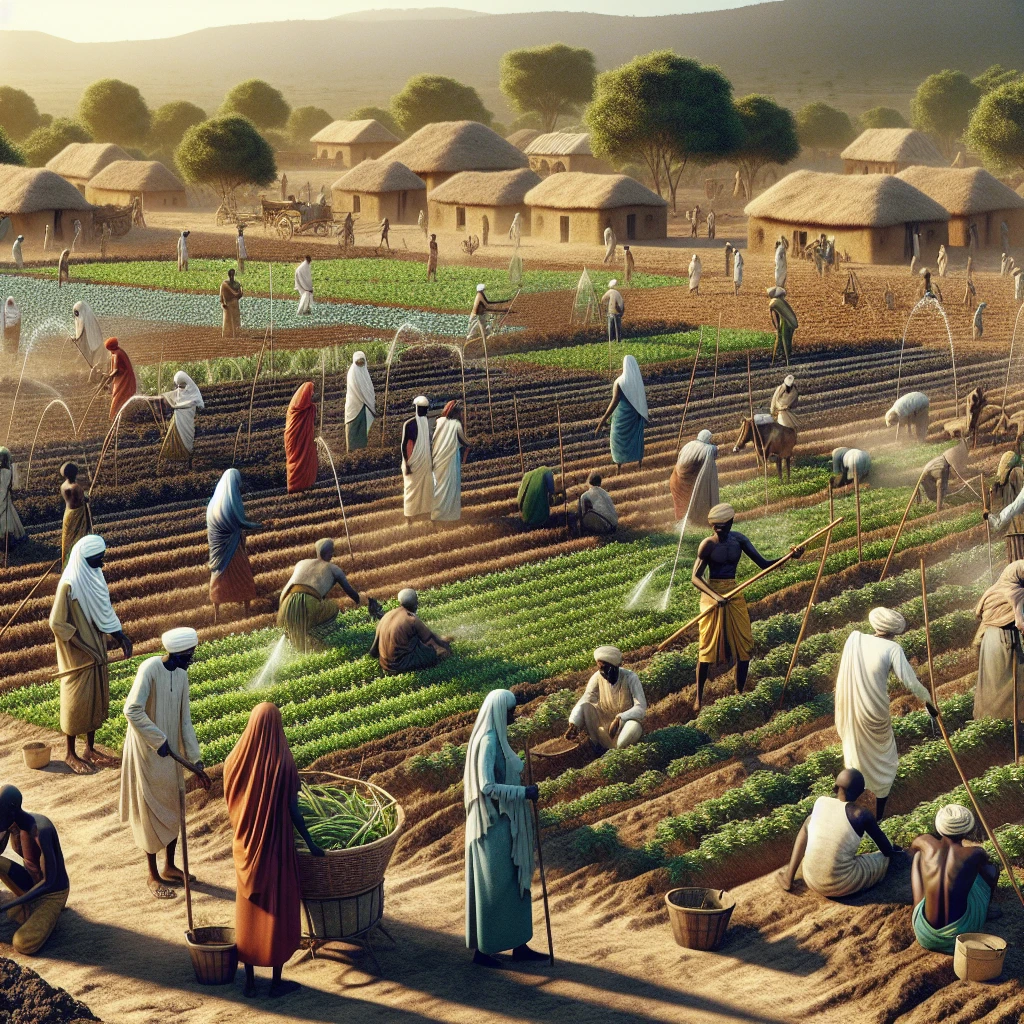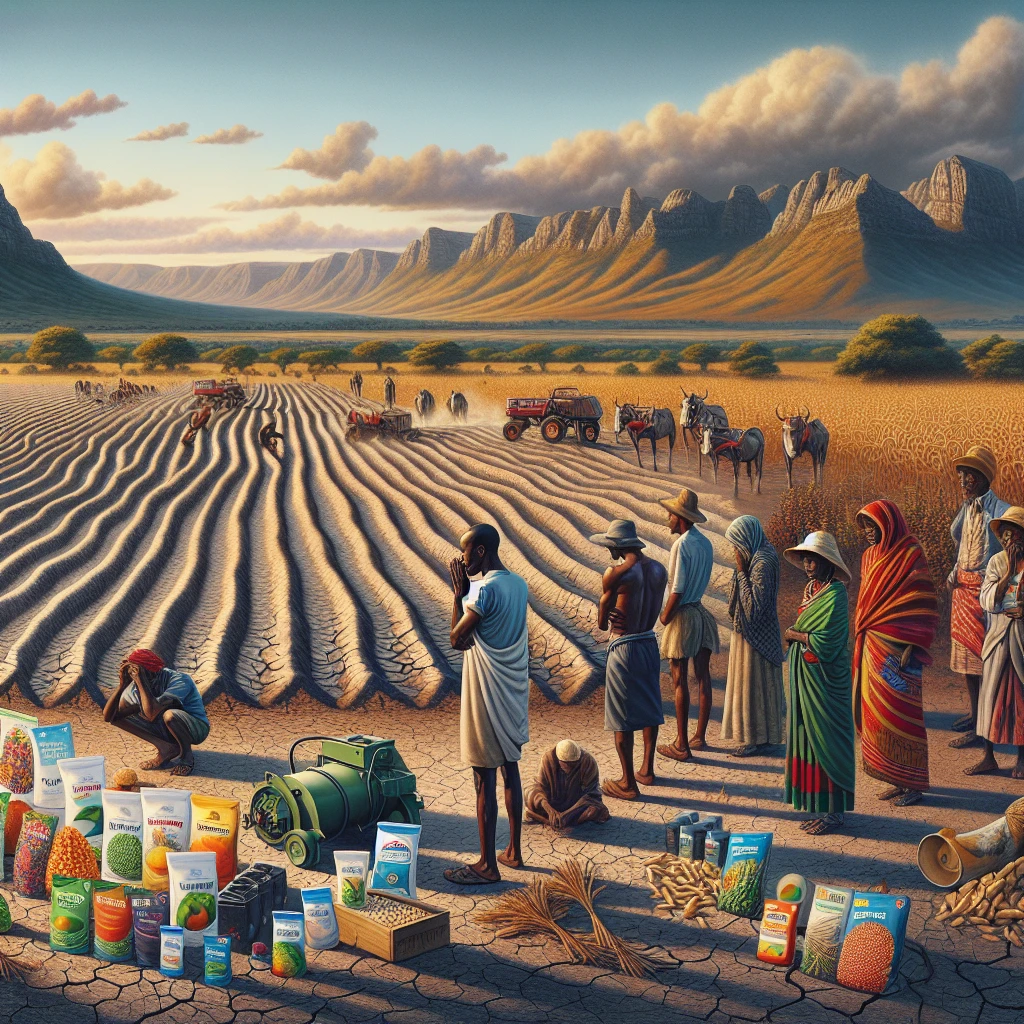

Food shortages in Sub-Saharan Africa refer to the inadequate availability of food to meet the nutritional needs of the population in this region. Understanding the causes of food shortages is crucial for developing effective strategies to address this issue and improve food security in Sub-Saharan Africa.
The main causes of food shortages in Sub-Saharan Africa include extreme poverty, climate change, and lack of resilience to climatic events.
Check out this Youtube video: Learn about the causes of food shortages in sub-Saharan Africa and the current hunger crisis affecting 346 million people. Stay informed and help make a difference.
Political Instability
The impact of political instability on food production and distribution in sub-Saharan Africa is profound. Unstable governments often struggle to maintain essential infrastructure, such as roads and transportation networks, leading to difficulties in distributing food to remote areas.
Additionally, political conflicts and power struggles can disrupt agricultural activities, causing delays in planting and harvesting, further exacerbating food shortages.
Examples of political conflicts leading to food shortages are abundant in the region. One notable example is the ongoing conflict in South Sudan, where political instability has resulted in the displacement of farmers, disruption of agricultural activities, and hindered food distribution, leading to severe food insecurity for millions of people.
Similarly, the protracted civil war in the Democratic Republic of Congo has severely impacted food production and distribution, causing widespread hunger and malnutrition.
The effect of unstable governments on agriculture and trade is detrimental, as policies and regulations are often inconsistent and subject to frequent change. In addition, corrupt practices and mismanagement of resources by unstable governments can lead to inefficiencies in agriculture and hinder international trade partnerships, further compounding food shortages in the region.
| Country | Political Conflict Impacting Food Shortages |
|---|---|
| South Sudan | Displacement of farmers and disrupted distribution |
| Democratic Republic of Congo | Protracted conflict impacting food production and trade |
Climate Change
The effects of climate change on agriculture
Climate change has severe implications for agriculture, affecting crop yields, livestock health, and overall food production. Rising temperatures and irregular precipitation patterns disrupt the growth of crops, leading to reduced yields and compromised food supply.
This poses a significant threat to food security in Sub-Saharan Africa and exacerbates existing challenges in the region.
Drought, flooding, and extreme weather patterns
The intensification of droughts and increased occurrences of flooding and extreme weather events can devastate agricultural landscapes. Droughts dry out soils, leading to water scarcity for crops, while flooding can destroy fields and infrastructure necessary for food production.
These extreme weather patterns disrupt farming activities and contribute to food shortages in Sub-Saharan Africa, amplifying the region’s vulnerability to hunger and malnutrition.
The role of climate change in exacerbating food shortages in Sub-Saharan Africa
Climate change plays a pivotal role in exacerbating food shortages in Sub-Saharan Africa by directly impacting agricultural productivity. The changing climate conditions pose significant challenges to farmers, making it increasingly difficult to maintain consistent and reliable food production.
As a result, the region grapples with heightened food insecurity, affecting the livelihoods of millions and underscoring the urgent need for sustainable solutions to mitigate the impact of climate change on food availability.
Economic Factors
Poverty and Lack of Access to Resources
The poverty rate in sub-Saharan Africa contributes significantly to food shortages due to limited access to essential resources such as land, technology, and finance. This leads to reduced agricultural productivity, hindering the region’s ability to produce enough food to meet the population’s needs.
Impact of Inflation on Food Prices
Inflation has a direct impact on food prices in sub-Saharan Africa, making it challenging for individuals to afford essential food items. Rising inflation leads to higher production and transportation costs, which are ultimately passed on to consumers, exacerbating food shortages and food insecurity.
International Trade Policies and Their Impact on Food Availability
International trade policies play a crucial role in determining the availability of food in sub-Saharan Africa. Restrictive trade agreements and tariffs can limit the importation of essential goods, creating supply shortages and driving up prices.
Additionally, trade policies may affect the region’s ability to export agricultural products, impacting its overall food availability.
| Economic Factor | Impact on Food Shortages |
|---|---|
| Poverty | Limits access to resources |
| Inflation | Drives up food prices |
| Trade Policies | Affect food availability |
Infrastructure Challenges
Inadequate transportation and storage facilities in Sub-Saharan Africa today exacerbate the food shortage crisis. Many countries in the region face challenges with poorly maintained road networks and limited access to refrigerated storage facilities.
This leads to significant food losses during transportation and storage, contributing to the shortage.
Lack of access to markets for farmers further compounds the issue. Many small-scale farmers struggle to reach markets due to impassable roads and inadequate transportation infrastructure.
This hampers their ability to sell their produce, resulting in food wastage and economic hardship.
The impact of poor infrastructure on food distribution is profound, as it disrupts the timely and efficient movement of food from production areas to consumers. This results in food scarcity in urban centers, where a large portion of the population resides, widening the gap between supply and demand.
| Challenges | Impact |
|---|---|
| Inadequate transportation | Increased food losses |
| Limited market access for farmers | Reduced income for farmers and food wastage |
| Disrupted food distribution | Food scarcity in urban areas |
Improving the infrastructure for transportation, storage, and market access is crucial to address the root causes of food shortages in Sub-Saharan Africa.
Agricultural Practices
Traditional farming methods and their limitations
Traditional farming methods in Sub-Saharan Africa are characterized by their heavy reliance on manual labor and rudimentary tools, leading to low productivity and limited yields. The limitations of these methods include vulnerability to climate variations, poor soil management practices, and susceptibility to pests and diseases.
Furthermore, traditional farming often lacks access to modern agricultural knowledge and technologies, hindering its ability to adapt to changing environmental conditions and market demands.
The role of modern agricultural techniques in addressing food shortages
Modern agricultural techniques, such as precision farming, smart irrigation systems, and genetically modified crops, play a crucial role in addressing food shortages in Sub-Saharan Africa. These techniques enhance productivity, improve crop resilience, and optimize resource utilization.
Moreover, the implementation of modern farming practices facilitates better adaptation to climate change, leading to increased food security and economic stability within local communities.
Access to seeds, fertilizers, and irrigation systems
Enhancing access to high-quality seeds, fertilizers, and efficient irrigation systems is vital for mitigating food shortages in Sub-Saharan Africa. Improved access empowers farmers to maximize their crop yields and resilience to environmental challenges.
Additionally, promoting access to these essential resources stimulates agricultural innovation and fosters sustainable farming practices, contributing to long-term food security in the region.
| Aspect | Importance |
|---|---|
| Quality Seeds | Essential for improving crop yields and resilience |
| Fertilizers | Enhance soil fertility and contribute to increased agricultural productivity |
| Irrigation Systems | Enable efficient water usage and support consistent crop growth |
These modern agricultural inputs and technologies are fundamental in enabling smallholder farmers to achieve greater food production and economic prosperity, ultimately contributing to the alleviation of food shortages in Sub-Saharan Africa.
Population Growth
The impact of population growth on food demand:
Rapid population growth significantly increases the demand for food worldwide. As more people are born, the overall need for sustenance surges, putting immense pressure on global food resources and supply chains.
This demand spike necessitates a substantial increase in food production to prevent shortages and ensure adequate sustenance for everyone.
Lack of sufficient food production to meet growing demand:
The current level of food production is inadequate to meet the escalating demand driven by population growth. This insufficiency poses a critical challenge, leading to potential food shortages and hunger crises, particularly in regions with densely populated communities.
As such, addressing this deficiency in production becomes pivotal to prevent widespread food insecurity.
Addressing the challenge of feeding a rapidly growing population:
Efficiently addressing the challenge of feeding a rapidly growing population demands strategic initiatives to enhance food production, distribution, and accessibility. Implementing sustainable agricultural practices, investing in technological advancements, and promoting equitable food distribution are crucial steps in alleviating the strain on food resources caused by population growth.
Additionally, prioritizing nutrition education and resource management is imperative to ensure that the burgeoning population has consistent access to nourishing food.
Conflict and Instability
The role of ongoing conflicts in disrupting food production and distribution
Ongoing conflicts in sub-Saharan Africa play a significant role in disrupting food production and distribution. The devastating impact of warfare on agriculture leads to the destruction of farmland, livestock, and critical infrastructure. As a result, access to farming resources such as fertilizers and equipment becomes severely constrained, hampering the overall food production capacity. Additionally, conflicts disrupt supply chains, making it difficult to transport food from production areas to markets, exacerbating food scarcity and hunger.
Internally displaced persons and the impact on food security
The presence of internally displaced persons (IDPs) further aggravates food security in conflict-affected regions. The displacement of communities due to ongoing conflicts places immense pressure on the existing food resources in host communities. The sudden influx of IDPs strains the availability and access to food, intensifying the overall food scarcity crisis. This results in heightened reliance on food assistance programs to meet the increased demand for sustenance.
International aid and humanitarian efforts in conflict-affected areas
International aid and humanitarian efforts play a crucial role in addressing the food shortages in conflict-affected areas of sub-Saharan Africa. Organizations providing humanitarian assistance, such as the United Nations and various NGOs, offer vital support by delivering food aid, medical supplies, and essential provisions to communities affected by conflict. These efforts not only alleviate immediate hunger but also contribute to stabilizing food security in the long term, mitigating the adverse consequences of ongoing conflicts on the availability and accessibility of food resources.
| Conflict and Instability |
|---|
| Ongoing Conflicts |
| Displacement of Communities |
| Humanitarian Aid |
The complex interplay between ongoing conflicts, internal displacement, and international aid profoundly impacts food security in sub-Saharan Africa, warranting concerted efforts to address the root causes and provide sustainable solutions to mitigate the region’s food shortages.
Access to Education
In addressing food shortages, education plays a crucial role in creating sustainable solutions. Educating communities about nutrition, food production, and conservation fosters a deeper understanding of the issues, leading to more effective long-term solutions.
The role of education in addressing food shortages
Education empowers individuals and communities to make informed decisions regarding food production, distribution, and consumption. By teaching sustainable agricultural practices and efficient resource management, education helps mitigate food shortages by improving overall food security.
Training programs for farmers
Implementing comprehensive training programs equips farmers with the knowledge and skills necessary to optimize crop yields, mitigate environmental impact, and adapt to changing climate conditions. Such programs also provide valuable insights into market trends and pricing strategies, bolstering farmers’ economic stability.
The impact of education on sustainable agriculture
Through education, the agricultural sector gains a vital understanding of the interconnectedness between ecological balance, resource usage, and food production. This leads to the adoption of sustainable farming practices that prioritize long-term environmental resilience and food security.
| Education Initiatives | Impact |
|---|---|
| Nutrition Education | Improved dietary choices and health outcomes |
| Sustainable Practices Training | Reduction in environmental impact and increased yields |
| Market Analysis Workshops | Enhanced economic stability and strategic decision-making |
By investing in education and training, we pave the way for a sustainable agricultural future that can effectively combat food shortages in Sub-Saharan Africa.
All your responses should be written in English (USA).
Government Policies
The effects of agricultural policies on food production
The effects of agricultural policies on food production are monumental. Government policies play a crucial role in shaping the agricultural sector, impacting food production levels, and influencing the availability of food for the population.
These policies encompass various aspects such as land ownership, use of technology, investment in infrastructure, and trade regulations, all of which directly affect the productivity and efficiency of the agricultural industry. For instance, policies promoting sustainable farming methods and providing access to modern farming equipment can significantly enhance food production, whereas restrictive trade policies can impede the availability of certain food items.
Subsidies for farmers and their impact on food availability
Subsidies for farmers have a profound impact on food availability. Government subsidies serve as a vital support mechanism for farmers, enabling them to overcome financial challenges and invest in advanced agricultural practices.
By offering subsidies for essential resources like fertilizers, seeds, and machinery, governments can bolster agricultural productivity, leading to increased food availability for the populace. Moreover, subsidies often incentivize farmers to cultivate specific crops, which can directly influence the diversity and quantity of food in the market.
However, it is crucial to ensure that subsidies are targeted effectively to avoid distorting market prices and perpetuating overproduction of certain food items.
The role of government in addressing food shortages
The role of government in addressing food shortages is pivotal. Governments are tasked with implementing strategic measures to mitigate food shortages and ensure food security for their citizens.
This involves devising comprehensive policies to regulate food production, storage, and distribution, as well as implementing programs to support small-scale farmers and promote sustainable agricultural practices. Additionally, government intervention in times of crisis, such as natural disasters or economic downturns, is essential to swiftly address food shortages and prevent humanitarian crises.
By collaborating with international organizations and enacting proactive policies, governments can effectively tackle food shortages and safeguard the well-being of their population.
| Government Policy | Impact |
|---|---|
| Agricultural | Significant impact on agricultural productivity, affecting food availability and market prices |
| Subsidies | Directly influence farmers’ ability to produce, impacting food supply and market competitiveness |
| Food Shortages | Government intervention crucial in addressing and preventing food shortages |
Corruption
The impact of corruption on food distribution
Corruption significantly hampers the distribution of food, leading to unequal access and scarcity. This unethical practice creates barriers for small farmers, limiting their capabilities and reducing overall food availability.
As a result, households can experience food insecurity due to the diminished access to essential food supplies.
Examples of corruption in the food supply chain
Corruption in the food supply chain can manifest in various forms, such as bureaucratic misconduct leading to household food insecurity and land corruption affecting farming and food security. A striking example is the manipulation of land administration, which deprives communities of access to land, intensifying poverty and hunger.
Additionally, misleading health claims by food industries can mislead consumers, impacting their food choices and ultimately their well-being.
Addressing corruption to improve food security
To enhance food security, rigorous measures must be implemented to combat corruption. This involves high-impact government interventions aimed at reducing corrupt practices and ensuring fair access to land and resources.
Transparency plays a vital role in mitigating corruption risks in the food supply chain, enabling equitable and reliable food production.
Gender Inequality
The impact of gender inequality on agriculture
Gender inequality in agriculture has a profound impact on food production and sustainability. With women accounting for nearly half of the agricultural labor force in developing countries, but producing significantly less than men, it hampers the overall productivity of the sector.
This disparity results in reduced agricultural output, thereby contributing to food shortages in sub-Saharan Africa and beyond.
Access to resources for female farmers
Female farmers face substantial challenges in accessing essential resources such as land, credit, and agricultural inputs. Inadequate access to these resources limits their ability to optimize farming activities, leading to diminished crop yields and heightened food insecurity.
Addressing these resource disparities is crucial to mitigating food shortages in sub-Saharan Africa and empowering female farmers to contribute more substantially to agricultural production.
Women’s role in addressing food shortages
Women play a pivotal role in addressing food shortages, particularly in sub-Saharan Africa. By addressing gender inequalities in access to resources and opportunities, women can substantially enhance agricultural productivity and alleviate food scarcity.
Empowering women in agriculture not only benefits their individual livelihoods but also contributes to overall food security and economic prosperity in the region.
Gender inequality has a significant adverse effect on agricultural productivity, particularly within the context of sub-Saharan Africa. By addressing resource disparities and empowering female farmers, the region can effectively confront food shortages and pave the way for sustainable agricultural development.
Health and Nutrition
The relationship between food shortages and malnutrition
The relationship between food shortages and malnutrition is deeply intertwined. When there’s a scarcity of food, individuals and communities are unable to access essential nutrients, leading to malnutrition.
This results in deficiencies of vital vitamins and minerals, affecting overall health and wellbeing. Malnutrition further weakens immune systems and increases susceptibility to diseases, exacerbating the impact of food shortages on individuals’ health.
The long-term health effects of food insecurity
Food insecurity has profound and lasting health effects. Prolonged food insecurity can lead to a range of health issues, including stunted growth, developmental delays in children, and higher risk of chronic diseases such as diabetes, heart disease, and mental health disorders in both children and adults.
The long-term physical and mental health consequences of food insecurity underscore the critical need for sustainable solutions to address this pressing issue.
Nutrition programs and their impact on addressing food shortages
Nutrition programs play a crucial role in addressing food shortages. Through initiatives like school feeding programs, community nutrition education, and food assistance programs, essential nutrients can reach those most in need.
These programs not only alleviate immediate hunger but also contribute to long-term health by ensuring access to a balanced diet. Moreover, comprehensive nutrition programs can break the cycle of food insecurity and malnutrition, empowering individuals and communities to lead healthier lives.
| Nutrition Program | Impact |
|---|---|
| School Feeding Programs | Provides essential nutrients to children, supporting healthy development and learning. |
| Community Nutrition Education | Equips communities with knowledge about healthy eating habits, promoting better nutrition and health outcomes. |
| Food Assistance Programs | Ensures access to nutritious food for vulnerable populations, safeguarding against the adverse health impacts of food shortages. |
The relationship between food shortages and malnutrition is evident, with alarming long-term health effects. However, effective nutrition programs have the potential to address food shortages and mitigate the associated health risks, playing a pivotal role in creating a healthier and more food-secure future for all.
International Aid and Assistance
The role of international organizations in addressing food shortages
International organizations such as the Food and Agriculture Organization (FAO) and the World Food Programme (WFP) play a crucial role in addressing food shortages in sub-Saharan Africa. These organizations work to eliminate hunger, food insecurity, and malnutrition through strategic initiatives and aid programs aimed at improving food access and distribution in affected areas.
Challenges in delivering aid to affected areas
Delivering aid to affected areas in sub-Saharan Africa poses significant challenges, including supply chain disruptions, greater poverty, supply shortages, and restricted access to remote or conflict-ridden regions. Additionally, security issues and attacks on aid workers further complicate the delivery of essential food assistance to those in need.
The impact of international assistance on food security
International assistance has a profound impact on food security in sub-Saharan Africa, especially in the alleviation of acute food insecurity. However, challenges such as higher import costs and uncertainties in aid effectiveness require a strategic approach to ensure long-term sustainable food security in the region.
Cultural Factors
The influence of cultural practices on food production can significantly impact the availability of food in Sub-Saharan Africa. Traditional farming methods, such as shifting cultivation and pastoralism, have been deeply rooted in the local culture for generations.
These practices, although reflective of rich traditions, often lack efficiency, leading to lower agricultural productivity and ultimately contributing to food shortages.
In Sub-Saharan Africa, traditional food preservation and storage methods play a crucial role in maintaining food security. Techniques such as drying, smoking, and fermentation have been practiced for centuries, allowing communities to prolong the shelf life of perishable foods.
However, with the changing climate and increased unpredictability of weather patterns, these traditional methods are facing new challenges, affecting the overall food supply in the region.
Addressing cultural barriers to food security requires a deep understanding and respect for the local customs and beliefs. Communities must be actively engaged in the development of sustainable solutions that align with their cultural values.
Initiatives focused on preserving traditional agricultural knowledge, improving infrastructure for food storage, and promoting diverse and resilient crop varieties can help bridge the gap between cultural practices and modern food security needs.
| Traditional Food Preservation Methods | Highlights |
|---|---|
| Drying | One of the oldest techniques used to hamper food decomposition. |
| Smoking | Used to dry out and preserve meat, with both cold and hot smoking methods. |
| Fermentation | A method for preserving foods like vegetables and grains, enhancing their shelf life. |
These timeless cultural practices, while deeply ingrained in the regional traditions, need to be integrated with modern solutions and technology to ensure sustainable food production and security.
COVID-19 Pandemic
The impact of the COVID-19 pandemic on food shortages
The COVID-19 pandemic has had a significant impact on food shortages in sub-Saharan Africa. With widespread lockdowns and travel restrictions, food supply chains were disrupted, and there was a reduction in agricultural productivity.
This led to a decrease in food availability, resulting in food shortages. Furthermore, the economic fallout from the pandemic caused widespread unemployment and income loss, pushing many people into food insecurity.
As a result, the pandemic has exacerbated an already existing problem of food shortages in the region.
Disruption of supply chains
The disruption of supply chains due to the COVID-19 pandemic has been a major contributor to food shortages in sub-Saharan Africa. Lockdowns and restrictions hindered the transportation and distribution of food, leading to a decrease in food accessibility for many communities.
Additionally, the closure of food production facilities and limitations on international trade further exacerbated the situation, making it difficult for people to access essential food supplies.
The role of the global community in addressing pandemic-related food insecurity
The global community has a crucial role in addressing pandemic-related food insecurity in sub-Saharan Africa. International organizations and donor countries have an opportunity to provide support in the form of financial aid, food distribution, and assistance in restoring disrupted supply chains.
By working in collaboration with local governments and organizations, the global community can help mitigate the impact of food shortages and contribute to long-term solutions for food security in the region.
| Causes of Food Shortages in Sub-Saharan Africa | COVID-19 Impact |
|---|---|
| Disrupted supply chains | Reduced food availability and accessibility due to transportation and distribution challenges. |
| Economic fallout | Increase in unemployment and income loss leading to food insecurity. |
The COVID-19 pandemic has worsened food shortages in sub-Saharan Africa by disrupting supply chains and causing economic hardship. Addressing these challenges requires a coordinated effort from the global community to provide support and resources to ensure food security for vulnerable populations in the region.
Technology and Innovation
The role of technology in addressing food shortages
Technology plays a crucial role in addressing food shortages, especially in Sub-Saharan Africa. Innovations such as precision agriculture, AI, and IoT devices have revolutionized farming, enabling farmers to optimize resource allocation, increase efficiency, and boost output.
For instance, the use of drones and GPS technology allows farmers to monitor crop health and apply targeted treatments, reducing waste and maximizing yield.
Innovations in agriculture and food production
Innovations in agriculture and food production have significantly contributed to addressing food shortages. For example, advancements in farm automation, blockchain, and IoT in agriculture have streamlined processes, improved productivity, and enhanced sustainability.
Additionally, technologies such as indoor vertical farming and precision agriculture have the potential to revolutionize food production by maximizing space utilization and optimizing soil quality.
The potential of technology to improve food security in Sub-Saharan Africa
Technology holds immense potential to improve food security in Sub-Saharan Africa. For instance, post-harvest and agro-processing technologies can enhance food accessibility, while biofortification can make food more nutritious.
Furthermore, climate-smart solutions anchored in science, technology, and innovation, including precision agriculture and early warning systems, can effectively mitigate food instability and contribute to long-term food security in the region.
| Innovations | Impact |
|---|---|
| Precision Agriculture | Optimizes resource allocation and increases efficiency |
| AI and IoT Devices | Revolutionizes farming practices |
| Post-harvest Technologies | Enhances food accessibility |
| Farm Automation | Streamlines processes and boosts productivity |
Recommended Amazon Products for Addressing Food Shortages in Sub-Saharan Africa
Here’s a curated list of products that can help address food shortages in Sub-Saharan Africa. These recommendations are based on functionality, price, and reviews.
Water Irrigation System
A water irrigation system is essential in combating the effects of drought in Sub-Saharan Africa. The Kadaon Garden Sprinkler provides efficient water distribution, covering a large area to support agricultural needs. Check out the Kadaon Garden Sprinkler on Amazon for sustainable water irrigation.


Consider the following pros and cons for the Kadaon Garden Sprinkler:
| Pros | Cons |
|---|---|
| Provides efficient water distribution | Requires sufficient water supply |
| Covers a large area | Initial cost of installation |
| Supports agricultural needs | Maintenance requirements |
Solar-Powered Refrigeration System
Lack of adequate storage facilities contributes to food wastage in Sub-Saharan Africa. The ICECO VL45 Portable Refrigerator offers a solar-powered solution for preserving perishable food items. Explore the features of the ICECO VL45 Portable Refrigerator to support food preservation efforts.


Consider the following pros and cons for the ICECO VL45 Portable Refrigerator:
| Pros | Cons |
|---|---|
| Solar-powered for energy efficiency | Initial investment cost |
| Portable and versatile | Limited storage capacity |
| Suitable for off-grid areas | Exposure to extreme weather |
High-Yield Crop Seeds
Access to high-yield crop seeds is crucial for increasing food production. The Heirloom Vegetable Seeds Pack provides a variety of non-GMO, heirloom seeds suitable for diverse climates. Browse the Heirloom Vegetable Seeds Pack to support sustainable agriculture in Sub-Saharan Africa.


Consider the following pros and cons for the Heirloom Vegetable Seeds Pack:
| Pros | Cons |
|---|---|
| Diverse selection of seeds | Requires proper storage |
| Non-GMO and heirloom varieties | Learning curve for novice farmers |
| Well-suited for diverse climates | Environmental factors impact growth |
Top Recommended Product for Addressing Food Shortages in Sub-Saharan Africa
If you’re looking for the best solution to address food shortages in Sub-Saharan Africa, we highly recommend the Kadaon Garden Sprinkler. It provides efficient water distribution, covers a large area, and supports agricultural needs. Ready to improve food production? Check out the Kadaon Garden Sprinkler today for sustainable irrigation!


Conclusion
The main causes of food shortages in Sub-Saharan Africa today include climate change, which results in droughts and erratic rainfall, reducing agricultural productivity. Additionally, poverty and lack of access to resources such as land, water, and seeds contribute to food insecurity in the region.
Lastly, conflict and political instability lead to disruptions in food production and distribution, exacerbating the problem of food shortages.
It is crucial to address these causes for long-term food security in Sub-Saharan Africa. By implementing sustainable farming practices, investing in infrastructure for irrigation and storage, and promoting economic development to lift people out of poverty, the region can work towards ensuring an adequate and stable food supply for its population.
It is imperative for individuals, governments, and international organizations to work together towards sustainable solutions for food shortages in Sub-Saharan Africa. This can be achieved through increased investment in agricultural infrastructure, support for smallholder farmers, and the implementation of policies that promote food security and economic stability.
Additionally, efforts to address the impact of climate change and resolve conflicts in the region are essential for creating lasting solutions to food shortages.


